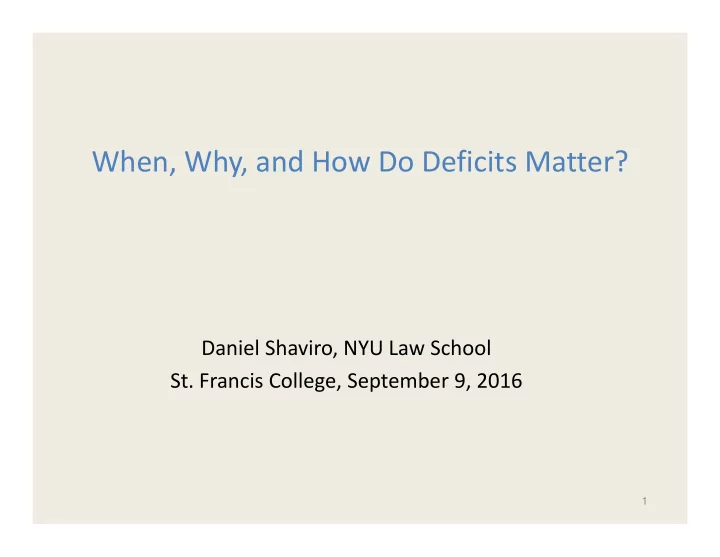

When, Why, and How Do Deficits Matter? Daniel Shaviro, NYU Law School St. Francis College, September 9, 2016 1
Bad thinking about deficits, part 1 Micawber ( David Copperfield ): “Annual income £20, annual expenditure £19, 19 & 6, result happiness. Annual income £20, annual expenditure £20, 0 & 6, result misery.” But individuals/households & governments are different! Micawber couldn’t raise taxes, borrow in his own currency. Plus, much debt is nationally “self ‐ owed;” foreigners can’t seize our assets / put us in debtor’s prison. 2
Bad thinking about deficits, part 2 Robert Eisner’s dad during the Great Depression: “Had a great day at the office – sold my desk!” A gov’t version: selling off future revenues at a discount. Chicago parking meters; 2004 foreign dividend tax holiday. Similar problem: U.S. military buys vs. “leases” fighter jets. 3
Bad thinking about deficits, part 3 Medicare prescription drugs, 2003: $18T infinite horizon estimated budgetary cost – but low in initial years. Infinite horizon: demographic & technological assumptions, etc., discounted to PV. Social Security: Suppose we treated FICA taxes as “loans” to the extent of PV expected repayment. No change in policy (or is there?): deficit now much higher! (Especially if we don’t switch midstream to this method for Social Security benefits) 4
Lesson # 1 about measurement #1 – Need a long ‐ term PV measure. Otherwise, arbitrary line ‐ drawing, opportunities for gamesmanship. But, infinite horizon?! Arguments on both sides of this! Fiscal gap: PV gap between expected outlays & revenues under “current policy” – but what does that mean? It’s definitionally zero if count default, etc. as repayment! A stock not a flow measure; better stated as a % of GDP than in absolute $$ terms. 5
Lesson # 2 about measurement If not using infinite horizon, beware of labels! E.g., debt/repayment vs. tax/transfer; sale vs. lease. Also be mindful of “representativeness” – are the in ‐ years like the out ‐ years, or are they systematically different? Differences can reflect manipulation (sell the desk, delayed start ‐ up, bogus phase ‐ out). They can also reflect long ‐ term trends (e.g., demography). 6
Why might deficits (etc.) matter? Issues can be grouped into: (1) Policy sustainability, (2) Generational (or other) distributional effects, (3) Macroeconomic effects, (4) Political economy effects. 7
Lesson # 3 about measurement Need to know what we’re measuring & why! Fiscal gap might be good for some purposes but not others. Another is generational accounting (GA). This attributes payments & receipts to age cohorts (or other groups) on a lifetime basis, or else from today forward. One problem here is when/how to count in ‐ kind benefits. 8
(1) Policy sustainability Everything must ultimately be paid for (fiscal gap of zero) – but a stable debt to GDP ratio can persist indefinitely. If fiscal gap is or will get too high, revenues &/or outlays will need to adjust. “Smooth” adjustment is usually better than sharply discontinuous. (E.g., tax rates, Medicare benefits.) Plus, the risk of a “Cretaceous event.” Rising inflation might come first, but could go discontinuously to a credit collapse. 9
(2) Generational effects Large fiscal gap that will be dealt with later implies adverse effect on future generations – e.g., entitlements cuts. We hope they’ll be richer than us – but will they also have better things to spend $$ on? (E.g., new lifesaving treatments) Can’t infer generational effects just from deficits! E.g., spending on young children vs. seniors. Or, “pay as you go” retirement benefits that the first generation of seniors gets for free. 10
(3) Macroeconomic effects Deficits may reduce national saving if spent on current consumption &/or people feel richer, spend more. But not if in lieu of productive investment! They can also affect the business cycle – especially when tax or spending changes go to people with high marginal propensity to consume. There also are circumstances where they are inflationary. 11
(4) Political economy effects These are complex & variable – but some familiar versions: (a) “Buy now, pay later” – would prescription drugs or the Iraq War have happened if funding had to be specified? (b) “Starve the beast” – make the deficit worse in ways you like, so it won’t get worse in ways you dislike.* Trump: We should cut taxes by $10T over the next 10 years – but we can’t afford to defend Europe or Japan. Unclear if this is more (a), or more (b). *Tends to be rebutted by historical data! – deficit indifference contagious between the two sides of the ledger. 12
Past, present, and projected future* (1) Importance of business cycle; (2) slow rate of projected increase (under current policy). *This & all ensuing charts are from CBO publications in January & March 2016. 13
Revenues vs. outlays in the budget 14
Why are outlays projected to increase? It’s not about discretionary spending! 15
Another picture of the outlay side 16
Increased net interest expense as public debt grows 17
Projected growth in public debt The level matters less than the trend. 18
Alternative scenarios Despite fixed elements, we’re at an inflection point. 19
Recommend
More recommend